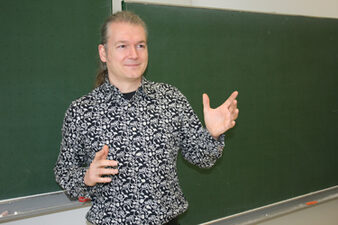About the project
The "CHP plus storage" project - system and operation optimization to make CHP operation more flexible with innovative storage technologies - aims to achieve more efficient use of combined heat and power systems in private households. In addition to the technical objectives, the participating households are also being considered. The focus here is on the influence of technical innovations on the behavior and attitudes as well as fundamental motivations, intentions and attitudes of the participating households.
How a micro-CHP system works
An important cornerstone for increasing energy efficiency is the use of innovative combined heat and power (CHP) systems. The North Rhine-Westphalian state government wants to drive forward the energy transition in the "energy state" of North Rhine-Westphalia by expanding combined heat and power generation. By 2020, the proportion of electricity generated by CHP plants in NRW is to be increased to at least 25 percent.
There is currently an imbalance between the electricity generated by the micro-CHP system and the electricity required in the household during the day: in the morning hours, more electricity is provided than used, whereas in the evening hours, more electricity is required than the micro-CHP system can generate, meaning that electricity has to be drawn from the grid. The "CHP plus storage" project aims to make better use of "electricity-generating heating systems" by intelligently storing the energy produced by the CHP system.
The project builds on the results of the "100 CHP systems for Bottrop" project and adds electricity storage to selected CHP systems of the participating private households.
In addition to the technical components, another focus of the project is the investigation and monitoring of the households in which the systems are operated and tested. Fachhochschule Dortmund will conduct in-depth interviews with the participating owners in order to investigate the influence of the technical innovation on the behavior and attitudes of the users.
On the other hand, following on from the survey conducted in the previous project, a long-term survey of all users of the CHP systems will be carried out. In particular, this will provide information on the internal psychological characteristics of the participating households, such as attitudes and intentions to save energy, motivation to participate in the project and heating-related behavior.
What are micro-CHP systems?
Combined heat and power (CHP) is a principle by which both heat and electricity can be generated from a primary energy source (e.g. natural gas). This means that the primary energy supplied is used more efficiently and energy consumption is significantly reduced.
Micro-CHP systems are systems with an electrical output of up to 50 kW and are designed for use in detached houses and smaller apartment buildings. By expanding the systems with storage units, the current imbalance between electricity supply and electricity use can be balanced out over the course of the day. This would result in a more efficient use of energy, as the surplus energy in the morning hours would no longer be fed into the grid and no additional energy would have to be drawn from the grid in the afternoon.
Sponsor
Ministry for Innovation, Business Studies, Research and Technology of the State of North Rhine-Westphalia with funds from the Innovation program area of the "Program for Rational Energy Use, Renewable Energies and Energy Saving" (progres.NRW). The project sponsor is Forschungszentrum Jülich.
Cooperation/project partners
Gas and Heat Institute Essen (network coordinator)
Innovation City Management GmbH Bottrop
Westfälische Wilhelms- Universität Münster - Münster Electrochemical Energy Technology (MEET)
Ruhr West University of Applied Sciences
Contact & Team
Contact person and management
Prof. Marcel Hunecke, Dr.
There will be no consultation hours during my sabbatical from 01.09.24 to 31.08.25.

